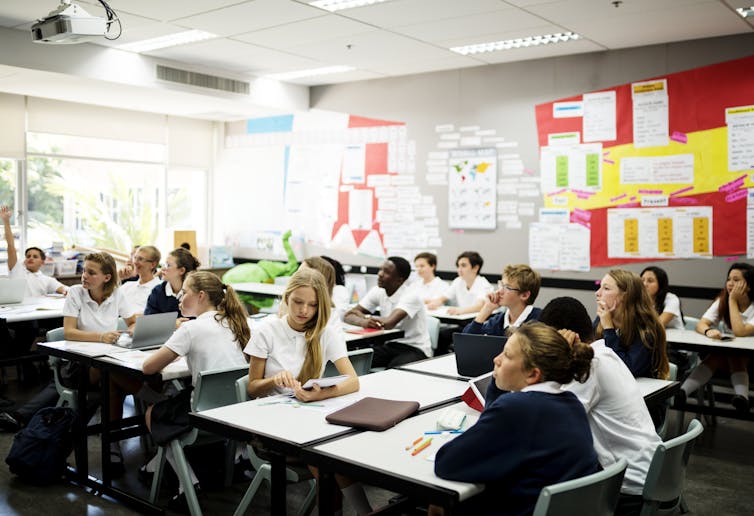Analysis suggests one strategy to forestall melancholy and nervousness is a powerful sense of connection at highschool

[ad_1]
About one in 5 younger Australians will expertise a psychological well being drawback like melancholy or nervousness annually. The COVID pandemic has solely intensified psychological well being considerations in younger individuals.
In Australia, many years of funding in early intervention and remedy providers haven’t decreased charges of melancholy and nervousness. This has sparked extra curiosity in what we will do to forestall psychological well being issues.
Faculties are ideally suited settings for prevention as a result of you possibly can attain massive numbers of scholars, assist construct wholesome abilities and habits, and capitalise on faculties being each studying and social environments.
Our new analysis suggests, one promising strategy to forestall melancholy and nervousness is by making certain college students really feel a powerful sense of belonging and connection to their highschool.
What’s ‘faculty connectedness’?
“College connectedness” is in regards to the high quality of engagement college students have with their friends, lecturers, and studying within the faculty setting.
It may embody issues comparable to, figuring out lecturers help them, having a good friend to speak to about their issues, feeling like they are often themselves in school and like faculty is an fulfilling place to be, and actively taking part in class actions.

Shutterstock
College connectedness has been linked to higher tutorial achievement and wellbeing. However it’s now attracting consideration as a doable strategy to defend in opposition to melancholy and nervousness.
Nonetheless, current analysis opinions have tended to take a look at cross-sectional research (information collected at one cut-off date) relatively than longitudinal research (information collected over time). And so they haven’t thought of nervousness and melancholy particularly, making it tough to find out if there’s a preventative impact.
Our analysis
In a new examine, we investigated whether or not faculty connectedness prevents the onset of later melancholy and nervousness in 14 to 24 year-olds. We did this with funding from the UK charity, the Wellcome Belief as a part of its push to determine modern interventions for nervousness and melancholy.
We systematically reviewed ten years of proof analyzing relationships between faculty connectedness and melancholy and nervousness. After screening 3,552 potential articles, we discovered 34 longitudinal and two intervention research which met our inclusion standards. The intervention research measured the change in members’ depressive signs earlier than and after a program, in comparison with members who didn’t obtain this system.
We then summarised the findings from the included articles.
To make sure younger individuals’s views knowledgeable our overview, we additionally partnered with 5 youth advisers aged 16 to 21 with lived expertise of psychological well being issues and/or the education system in Australia, Indonesia, and the Philippines.
Our findings
Most research discovered larger ranges of faculty connectedness predicted decrease ranges of melancholy and nervousness later. Most research examined melancholy.
For instance, United States one examine of almost 10,000 college students discovered larger ranges of self-reported faculty connectedness (questions included, “you’re feeling like you’re a part of your faculty”, “the lecturers in school deal with you pretty”) led to reductions in self-reported depressive signs prior to now week. This impact occurred each later in secondary faculty and continued into early maturity, even when accounting for earlier depressive signs.
Learn extra:
Self-compassion is the superpower yr 12 college students want for exams … and life past faculty
One other examine investigated the impact of a whole-school well being promotion program in over 5,000 secondary faculty college students in India.
This system inspired supportive relationships between members of the varsity neighborhood, promoted faculty belonging, elevated participation in class actions, and promoted social abilities amongst college students. The examine discovered this led to a discount in depressive signs 17 months later.
Reflections from youth advisers
Our findings resonated with the expertise of our youth advisers. For instance, one 18-year-old adviser from Australia mirrored,
I’ve had psychological well being points my complete life […] I seen the second that I moved faculties to a extra wholesome setting, the fast enchancment of my psychological well being.
One other 18-year-old adviser from Indonesia defined,
Understanding your faculty is there for you actually calms you down, takes yet one more thought out of your head, and extra weight off your shoulders.
Many of the research had been from high-income international locations, primarily the US, but our advisers harassed the significance of cultural context. One 16-year-old youth adviser defined the significance of faith.
In Indonesia you possibly can’t actually dismiss faith. You’ll be able to’t ignore it as a result of it’s so deeply rooted in our society and that in flip displays (on) different issues like our psychological well being and even faculty connectedness.
Apparently, we discovered one examine reported larger ranges of faculty connectedness led to larger ranges of inner misery. Our youth advisers famous that typically feeling extra related to high school can include elevated expectations from lecturers and strain to carry out, which could improve nervousness in some college students.
Learn extra:
The lacking center: puberty is a crucial time in school, so why aren’t we investing in it extra?
What does this imply for faculties?
Our findings present how faculties matter for psychological well being and that fostering faculty connectedness may be a strategy to forestall melancholy and nervousness.
Present analysis reveals there are a variety of “little issues” lecturers can do all through the day of their strange interactions with college students to foster faculty connectedness.
This consists of, actively listening to college students, being out there and accessible, advocating for college kids, encouraging college students of their faculty work even when they’re struggling, having empathy for college kids’ difficulties, and treating college students like “people”.
Learn extra:
Academics play a key function in serving to college students really feel they ‘belong’ in school
College students are additionally extra possible to ask for assist with their studying when lecturers say good day, speak to them and take an curiosity in what they’re doing, and present they’re pleased with them.
Our youth advisers bolstered the significance of feeling acknowledged by lecturers and friends and that college students want to have the ability to safely categorical their identification.
One 16-year-old youth adviser from Australia defined that feeling related to high school has many elements.
You’ve bought that social facet, however you’ve additionally bought extra-curricular actions, the way you’re going via your research, your lessons […] it’s the constructive feelings, it’s the relationships, it’s the which means, it’s engagement, the accomplishment, it’s all of that. As soon as you’re feeling supported in all these areas is while you really feel related.
Throughout the pandemic, faculty closures and distant studying have formed a distinct appreciation of the importance of colleges for psychological well being and wellbeing. The query now’s how governments, faculties and communities act on this data.
If this text has raised points for you or your little one, you possibly can name Lifeline on 13 11 14 or Youngsters Helpline on 1800 55 1800.
[ad_2]
Source_link




